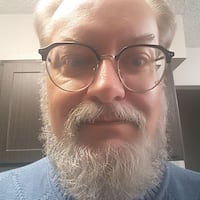As various public agencies look for ways to close the gap in medical care left by the 2022 closure of two hospitals in south Fulton County, a private clinic has started up to address some of the need — and is looking to partner with hospitals to provide in-home care for chronic conditions.
Hospital in Your Home, an idea transplanted from Australia, opened a clinic at 3755 Main St., Unit 101, in College Park to offer primary care and serve as a hub for its in-home services.
“We started seeing our first patients Nov. 13,” said Novella Tascoe, CEO and co-founder. An outreach coordinator identified area residents with the greatest need, and the clinic started seeing the most at-risk people as a soft opening, she said.
“In this area there’s really a dearth of primary care providers,” said Tascoe, who worked for 20 years as a respiratory therapist at the now-closed Atlanta Medical Center.
In 2022 Wellstar Health System closed Atlanta Medical Center and its associated East Point hospital, saying they were not financially viable. Regional officials decried the closings, saying they left a “health care desert” in south Fulton County — not just for hospital care, but for the primary care providers and specialist clinics that cluster near hospitals.
The closures left Grady Memorial Hospital as the only hospital in Fulton County serving the area south of Interstate 20. Fulton County government subsidizes Grady with more than $60 million a year to care for the uninsured and indigent. That contract is being renegotiated now.
Local governments and other entities have scrambled to find some way to increase medical care in the area. Morehouse School of Medicine has opened a full-service clinic in East Point that Fulton County expects to subsidize by $1.6 million a year.
Hospital in Your Home started in Australia. Its co-founder there, Michael Young, is co-founder of the American version as well, Tascoe said.
“We do intend to expand across the metro area, and long-term across the country,” she said.
The new Hospital in Your Home clinic offers primary care, but seeks to work with people who already have primary providers and help them manage chronic diseases, Tascoe said. The company provides remote monitoring devices to gather real-time vital signs and readings on various conditions, she said. Clinic staff watch for alerts from those devices and contact patients regularly, Tascoe said.
“Our goal and our model is really to spend more time with the patient, educating them,” she said. That means discussions on managing their conditions and detailed walk-throughs of how to use the high-tech monitoring devices, Tascoe said.
Hospital in Your Home wants partnerships with hospitals, helping to free up hospital beds by transitioning patients from hospital care to in-home monitoring and condition management, she said. The company has started talks with Grady, but such an agreement will be a long process, Tascoe said.
The privately-funded clinic accepts Medicare and Medicaid, aiming to serve older adults whose mobility might not make in-person clinic visits easy, she said.
“We don’t have the ability at this point to provide free care,” Tascoe said. But in-home care should be less expensive than a hospital stay, including for federal insurers, she said. The Medicare or Medicaid reimbursement for home care is $1,200 a day, “significantly lower” than the allowable reimbursement for inpatient care, Tascoe said.
About the Author




